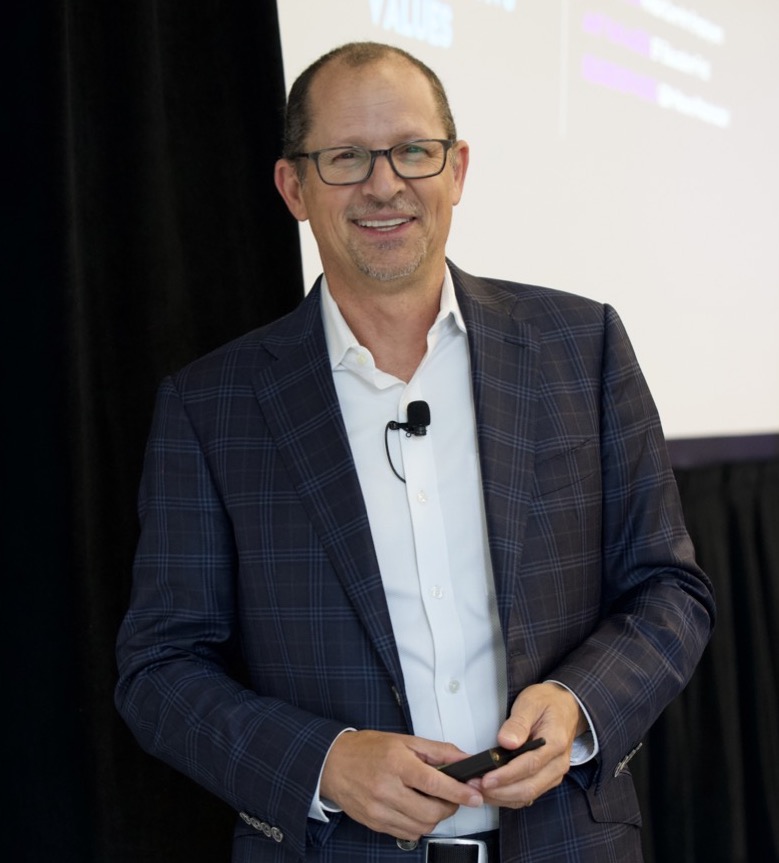Generative AI Is Forcing Employees to Be Agile—Companies, Be Ready


It used to be that if you had a “smart” job, you were safe. Manual labor could be replaced by a machine. But get an education, work with your brain, and you’d be set.
Well, that’s not the case anymore. Presenting at the From Day One Conference in Boston, Jeff Maggioncalda, CEO of Coursera, said new data points toward a big shift in how people do their jobs, all thanks to generative AI.
The thing is, it’s potentially going to impact pretty much every industry. Especially top wage earners who had previously been less replaceable. AI is changing that. “We’re all in the same boat,” Maggioncalda said.
Back in 2017, a report from McKinsey & Co. showed AI would have a minor impact among the more educated. But the report, updated just a few months ago with new data about AI, changed dramatically. Now it’s the opposite. “Fasten your seat belts, because things are changing,” Maggioncalda said. Not that every job will be automated, so to speak. But many jobs will have to be done differently.
Adapting Roles
Coursera’s co-founder Andrew Ng once said, “Artificial intelligence is the new electricity.”
While it’s not necessary for everyone to become electricians per se, knowing how to apply AI in job roles will be key, which is where HR comes into play to assist employees. “It will be far less dependent on technical expertise,” he said. “It’s going to be much more about understanding jobs, understanding people navigating through change.”

Coursera works with governments and businesses around the world to help them help their employees rise to the challenge of how generative AI is changing the global market. What they’ve come up with is targeted training for existing employees, while also moving to skills-based hiring. Finding new ways to assess whether people have those skills to open the aperture of who’s qualified for a job.
“There’s a whole range of potential implications of this impact. And there’s different occupations that will be most impacted by this,” he said. In particular, business and legal professionals, STEM professionals, community services, creatives, office support, anyone who deals with language, images, audio or video, will all be impacted.
“As one of my colleagues said, it’s one of those situations on the plane where they say, fix your mask before helping those next to you, because L&D is going to have to figure out how to educate people differently.”
CEOs Take Note
McKinsey & Co. estimated that generative AI will impact production by the trillions. Nearly every single software tool is going to have AI built into it that can be used in a different way to help increase productivity by automating and augmenting certain tasks, says Maggioncalda.
“Depending on how you respond to it, it can be an opportunity or a threat,” he said. Companies can use technology to better serve customers and increase productivity, and everyone’s got to be on board from the top down, including the CEO.
One of Coursera’s largest clients is a pharmaceutical company whose CEO recently created a global generative AI initiative for the company. Three people lead that initiative, including the CLO, the CTO, and the head of strategy. They report to the C-Suite once a month on generative AI.
Maggioncalda asked the CLO, “When’s the last time you presented to a CEO?” To which the CLO responded, maybe once a year. But now they’re talking to him once a month. That’s how important generative AI is to this global company, specifically their strategy to use it.
Specifically, the changes are in how people do their jobs, and that requires strategy. Training. Shifting. They can even use AI to accomplish these things – an inception of AI, if you will.
“Learning is going to be far more personalized and interactive than anything we’ve ever seen,” Maggioncalda said. “The ability to take and tailor training programs far more effectively than anything that you’ve ever seen before.”
Language translation is a huge part of it. Coursera has translated 2,000 courses into seven languages, building up to 4,000 courses in 14 languages. The potential to change things on a global scale is huge.
Training vs. Degrees
Currently underway is Coursera’s Generative AI Academy to assist with workforce transformation, helping people of different job roles figure out how to adapt to generative AI.
“So, if you’re a digital marketer, here’s what you need to know, if you’re an IT Helpdesk, here’s what you need to know, if you’re a software developer, here’s what you need to know. It will be very role specific, and it will be changing very quickly,” he said.
There’s so much more in the works, Maggioncalda added, and it’s going to change hiring and training for a lot of companies. In fact, hiring people without college degrees won’t be an issue; if they’re agile and adapt to the company training, employees can have more equitable access to the knowledge and the skills as well as the credentials.
Essentially, Coursera can help companies create program templates from building blocks that already exist, saving time and money and bringing the company forward quicker. One of their customers wanted to build a reference program that different company managers could customize. Curating content, using AI, is what will help companies train their people.
Using AI to help employees learn how to use AI? Now that’s the wave of the future.
Editor’s note: From Day One thanks our partner, Coursera, for sponsoring this thought leadeship spotlight.
Carrie Snider is a Phoenix, Ariz.-based journalist and marketing copywriter.
The From Day One Newsletter is a monthly roundup of articles, features, and editorials on innovative ways for companies to forge stronger relationships with their employees, customers, and communities.